
Misplaced Childhood is the third studio album by the British neo-prog band Marillion, released in 1985. It is a concept album loosely based on the childhood of Marillion's lead singer, Fish, who was inspired by a brief incident that occurred while he was under the influence of LSD.

Minstrel in the Gallery is the eighth studio album by British rock band Jethro Tull, released in September 1975. The album sees the band going in a different direction from their previous work War Child (1974), returning to a blend of electric and acoustic songs, in a manner closer to their early 1970s albums such as Benefit (1970), Aqualung (1971) and Thick as a Brick (1972). Making use of a newly constructed mobile recording studio commissioned and constructed specifically for the band, the album was the first Jethro Tull album to be recorded outside of the UK, being recorded in tax exile in Monte Carlo, Monaco.

Ladies and Gentlemen We Are Floating in Space is the third studio album by English space rock band Spiritualized, released on 16 June 1997. The album features guest appearances from the Balanescu Quartet, the London Community Gospel Choir and Dr. John.

...And Then There Were Three... is the ninth studio album by the English rock band Genesis. It was released on 31 March 1978 by Charisma Records and is their first recorded as a trio of singer/drummer Phil Collins, keyboardist Tony Banks, and bassist/guitarist Mike Rutherford, following the departure of guitarist Steve Hackett. The album marked a shift in the band's sound, mixing elements of their progressive rock roots with more accessible material, and Collins contributing to more of the group's songwriting.
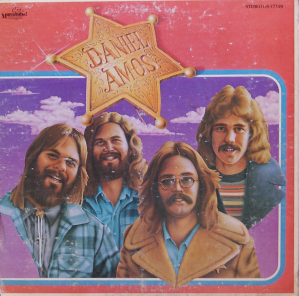
Daniel Amos is the self-titled debut album by Christian rock band Daniel Amos. The album was issued in 1976 by Maranatha! Music and was produced by Al Perkins. It is typical of the country rock sound the band performed in the mid-1970s before their switch to alternative rock in the early 1980s.
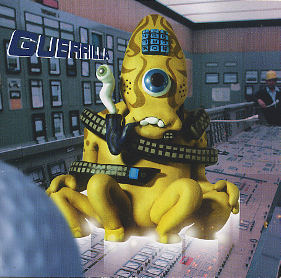
Guerrilla is the third studio album by Welsh rock band Super Furry Animals. The record was released on 14 June 1999 by Creation Records and peaked at number 10 in the UK Albums Chart. Guerrilla was conceived as a commercial 'pop' album and was produced by the band themselves, as regular producer Gorwel Owen felt exhausted after a busy schedule working for other bands. Recording took place at Real World Studios, Box, Wiltshire in mid-1998 with the group experimenting with a sampler for the first time and writing a number of songs in the studio. The band tried to create a 45-minute long, immediate sounding record, and therefore chose the upbeat songs from the 25 tracks which were recorded during sessions for the album. Guerrilla was chosen as the album's title as a pun on the group's name.
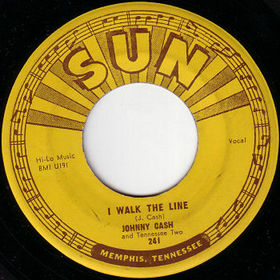
"I Walk the Line" is a song written and recorded in 1956 by Johnny Cash. After three attempts with moderate chart ratings, it became Cash's first #1 hit on the Billboard country chart, eventually reaching #17 on the Billboard Hot 100.
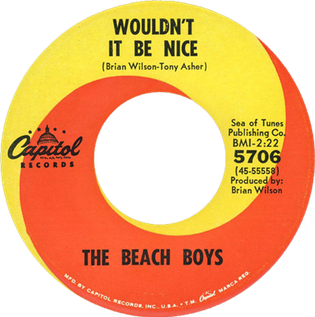
"Wouldn't It Be Nice" is a song by the American rock band the Beach Boys and the opening track from their 1966 album Pet Sounds. Written by Brian Wilson, Tony Asher, and Mike Love, it is distinguished for its sophisticated Wall of Sound-style arrangement and refined vocal performances, and is regarded among the band's finest songs. With its juxtaposition of joyous-sounding music and melancholic lyrics, it is considered a formative work of power pop, and with respect to musical innovation, progressive pop.

"Ordinary World" is a song by the English pop rock band Duran Duran, released on 19 December 1992 by Capitol as the first single from their second self-titled album (1993), commonly known as the Wedding Album. It was later released in the UK by EMI and Parlophone on 18 January 1993. The ballad, both written by the band and co-produced with John Jones, topped the US Billboard Top 40/Mainstream chart, the Canadian RPM 100 Hit Tracks chart, and the Italian Singles Chart. It also peaked at number three on the Billboard Hot 100, number two in Iceland and Sweden, and number six on the UK Singles Chart. The song's music video was directed by Nick Egan and filmed in California.
Baxter is a Swedish electronica band composed of two drum and bass producers and an emotive vocalist. The band set out to transform pop music by introducing melody, vocals and strong song-writing to a layered drum and bass/jungle-influenced rhythm.
"Can't See Me" is a song by Ian Brown. It was written by Brown and Mani and produced by Brown. The song was remixed by Bacon & Quarmby and released as the third single from Brown's debut solo album Unfinished Monkey Business. It was released in June 1998, and rose to number 21 on the UK Singles Chart. The song's lyrics refer to an incident when Brown saw His former Stone Roses band-mate John Squire in a village in Hale, Greater Manchester, not long after the split of the band. According to this story, Brown waved to Squire, but Squire hid behind a newspaper and would not acknowledge him.

Nephew was a Danish rock band formed in 1996 in Aarhus, Denmark. The band consisted of Simon Kvamm, Kristian Riis, Søren Arnholt, Kasper Toustrup, René Munk Thalund (keyboards), and Marie Højlund.

Sulk is the second studio album by the Scottish post-punk and pop band the Associates. It was released on 14 May 1982 on their own Associates imprint of Beggars Banquet Records for the UK and throughout the rest of Europe on WEA Records and in the US on 4 October by Sire Records.

Swing is the seventeenth studio album released by The Manhattan Transfer in 1997 on the Atlantic Records label. This album is a collection of 1930s and 1940s swing music with The Manhattan Transfer's jazz twist. The album also features a guest appearance by Stéphane Grappelli, one of his last recordings before his death.
The recordings made by the Beatles, a rock group from Liverpool, England, from their inception as the Quarrymen in 1957 to their break-up in 1970 and the reunion of their surviving members in the mid-1990s, have huge cultural and historical value. The studio session tapes are kept at Abbey Road Studios, formerly known as "EMI Recording Studios," where the Beatles recorded most of their music. While most have never been officially released, their outtakes and demos are seen by fans as collectables, and some of the recordings have appeared on countless bootlegs. The only outtakes and demos to be officially released were on The Beatles Anthology series and its tie-in singles and anniversary editions of their studio albums. Bits of some previously unreleased studio recordings were used in The Beatles: Rock Band video game as ambient noise and to give songs studio-sounding beginnings and endings. In 2013, Apple Records released the album The Beatles Bootleg Recordings 1963, which includes previously unreleased outtakes and demos from 1963, to stop the recordings from falling into the public domain.

Chaotic Resolve is the fourth album by Christian singer Plumb. It was released by Curb Records on February 28, 2006 and includes the single "Cut."
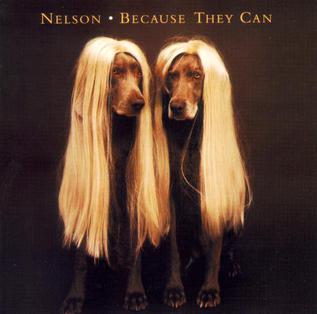
Because They Can is the second album from American rock group Nelson, released by Geffen Records in 1995.

Nino Ramsby, born Nina Ramsby, is a Swedish singer-songwriter and musician from Stockholm. During the 1990s he was the vocalist and guitarist for the alternative rock band Salt. He was also part of the bands Baxter and Grand Tone Music. Ramsby was born to a Finnish mother and a Swedish father.

"Too Far" is a song by Australian recording artist Kylie Minogue, taken from her sixth studio album Impossible Princess (1997). It was written and produced by Minogue, with additional production credits to Brothers in Rhythm. The song is a drum and bass song where Minogue describes her anger and frustration through its lyrics. It contains elements of club music and breakbeat music, and employs spoken word techniques.
















